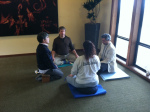How Does MindLESSness Inform Psychotherapy? Join the Conversation Amongst Teachers
The integration of Mindfulness and Psychotherapy is a topic of fast-growing interest among clinicians and clients worldwide. The following is the first in a series of informal conversations between Trudy Goodman, Ph.D., Elisha Goldstein, Ph.D. and Steven Hickman, Psy.D., the teachers for a unique upcoming professional training retreat entitled "Mindfulness in Psychotherapy" to be held October 2-7, 2011 at the Joshua Tree Retreat Center in Southern California. Enjoy!
 31 professionals came from as far away as Hong Kong to learn about MBCT and how it is taught, learning "from the inside out" in this amazing retreat format. Early morning movement and meditation practice and periods of silence (including several silent meals) punctuated our five days together in a way that allowed participants to ground their learning in the refuge of mindfulness.
31 professionals came from as far away as Hong Kong to learn about MBCT and how it is taught, learning "from the inside out" in this amazing retreat format. Early morning movement and meditation practice and periods of silence (including several silent meals) punctuated our five days together in a way that allowed participants to ground their learning in the refuge of mindfulness.